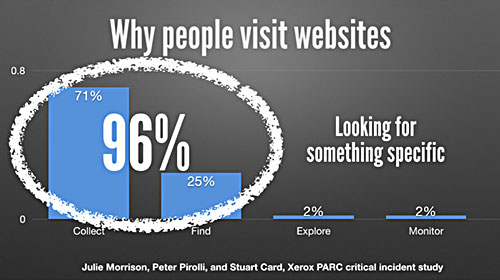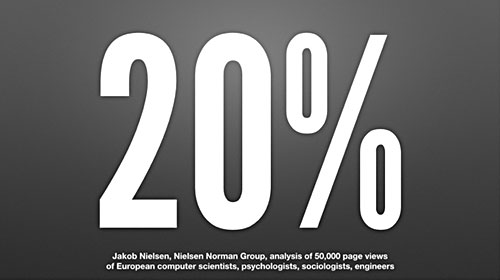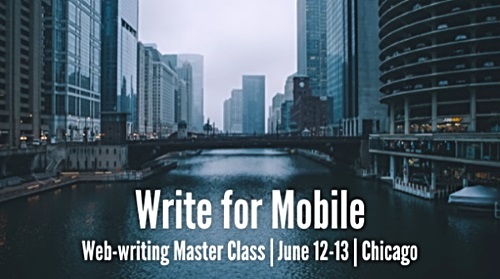Because ‘readers’ don’t read
Here’s the title of one of usability expert Jakob Nielsen’s earliest web-writing articles:1

How Users Read on the Web
The first paragraph:
They don’t.
“People read paper,” says TJ Larkin, principal of Larkin Communications Consulting. “They use the web.”
In fact, just 16% of people read word-by-word online, according to research by Dejan Marketing.2 Remarkably, that’s the same percentage Nielsen came up with in his 1997 study.
So if web visitors aren’t reading, what are they doing?
They’re not reading; they’re seeking.
They’re looking for something specific. According to a study by Xerox PARC, web visitors:
- Collect 71% of the time. They search for multiple pieces of information, maybe research for a Writing for Mobile workshop.
- Find 25%. They seek something specific, like “What is this bacalhau they want to serve me for lunch?”
- Explore 2%. They look around without a specific goal — aka “surfing.”
- Monitor 2%. They return to the same website to update information — say, checking CNN for the latest news.

In other words, web visitors have a goal 96% of the time, according to the PARC study. So much for “surfers.”
Same thing’s true on mobile. In fact, the No. 2. mobile task is searching for specific information. (No. 1: wasting time.)
“The dirtiest four-letter word in the English language: ‘read.’”
— Evelyn Wood Reading Dynamics website
Mobile visitors often seek information relevant to the here and now, like “Where is the nearest gas station?” In fact, according to a Pew study, some 49% of mobile users use their phones for location-based information.
How long do they spend?
So as they look for information, how much time do visitors spend on webpages? Not too long:
- The average page visit lasts less than a minute — but many are 10 seconds or less.3
- 55% of visitors spend fewer than 15 seconds on your website.4
- Visitors spend an average of 19 seconds looking at a webpage.5
During that time, according to Kara Pernice, Kathryn Whitenton and Jakob Nielsen, authors of How People Read on the Web, web visitors’ eyes land an average of 72 times on different elements on the page.
“As you watch users’ eyes negotiate pages at mind-blowing speeds, you might think that … it is just pure luck that anyone ever finds anything worthwhile on the web.”
— Kara Pernice, Kathryn Whitenton and Jakob Nielsen, in How People Read on the Web
Let’s do that math: 19 seconds divided by 72 “eye stops” equals about a quarter of a second per glance.
Definitely. Not. Reading.
“As you watch users’ eyes negotiate pages at mind-blowing speeds,” write Pernice et al., “you might think that … it is just pure luck that anyone ever finds anything worthwhile on the web.”
How much do they read?
As web visitors’ eyes race around your webpage for 10 to 20 seconds or so, how much of your content is actually sinking in?

About 20% of the words on the page, according to a Nielsen Norman Group analysis of 50,000 page views that European computer scientists, psychologists, sociologists, engineers and other highly educated professionals completed while going about their daily lives.
But which 20%?
Where are they looking?
So which words do they read?
The microcontent. They read the:
- Headlines
- Decks
- Subheads
- Links
- Lists
- Bold-faced text
And if you want to reach web visitors with your messages, that’s where you’ll be too.
Pass the skim test: Embed your key messages in the microcontent, or online display copy.
“People don’t read online. They scan.”
— Jakob Nielsen, “king of usability”
Want to reach flippers, skimmers and other nonreaders on the small screen? Learn how at our Write for Mobile Master Class on June 12-13 in Chicago. You’ll learn a four-part system for reaching readers on their smartphones, tablets and other mobile devices.
Save $100 with our group discounts.
|
[2] “Here’s Why Nobody Reads Your Content,” Dejan Marketing, June 11, 2015
[3] Kathryn Whitenton, “Satisficing: Quickly Meet Users’ Main Needs,” Neilsen Norman Group, March 30, 2014
[4] Tony Haile, CEO of Chartbeat; “What You Think You Know About the Web Is Wrong,” Time, March 9, 2014
[5] Kara Pernice, Kathryn Whitenton and Jakob Nielsen; How People Read on the Web; Neilsen Norman Group
